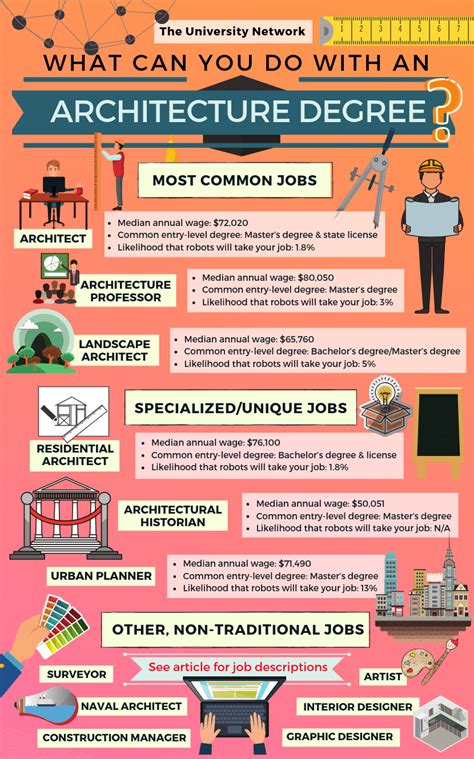Aspiring architects must navigate a complex academic path to embark on their fulfilling career. This article will delve into the educational requirements, key degrees, and essential skills needed to become a certified architect.

Educational Journey of an Architect
1. Bachelor’s Degree
All architects must possess a bachelor’s degree in architecture from an accredited program. The National Architectural Accrediting Board (NAAB) accredits architecture programs in the United States, ensuring they meet rigorous standards.
2. Master’s Degree (Optional)
While not always required, many architects pursue a Master of Architecture (M.Arch) to enhance their knowledge and skills. This advanced degree provides specialized training in areas such as sustainability, urban planning, and architectural theory.
Key Degrees in Architecture
1. Bachelor of Architecture (B.Arch)
The B.Arch is a professional degree that prepares students for the licensing examination and entry-level architectural practice. It typically takes five years to complete and includes coursework in design, structures, building systems, and architectural history.
2. Master of Architecture (M.Arch)
The M.Arch is typically a three-year program that builds upon the foundation of the B.Arch. It allows students to pursue advanced studies in particular areas of architecture and prepare for research or leadership roles.
Essential Skills for Architects
In addition to technical knowledge, architects require a range of essential skills:
- Design and Visualization: The ability to conceptualize and create innovative architectural designs
- Problem-Solving and Critical Thinking: Analyzing client needs, identifying solutions, and making informed decisions
- Communication and Presentation: Effectively communicating ideas through drawings, models, and presentations
- Teamwork and Collaboration: Working harmoniously with clients, contractors, and other professionals
- Technical Proficiency: Mastering building codes, construction materials, and specialized software
The Licensing Examination
After completing their education, aspiring architects must pass the Architectural Registration Examination (ARE) administered by the National Council of Architectural Registration Boards (NCARB). This rigorous exam tests the knowledge and skills required for architectural practice.
Accreditations and Certifications
- The National Council of Architectural Registration Boards (NCARB) offers credentials such as the NCARB Certificate, which demonstrates a commitment to professional development and continuing education.
- The American Institute of Architects (AIA) provides certifications in specific areas of architecture, such as sustainable design and healthcare architecture.
Pain Points and Motivations
Pain Points:
- High cost of education
- Long and demanding academic journey
- Competitive job market
Motivations:
- Passion for design and creating meaningful spaces
- Desire to make a positive impact on society
- Potential for financial success
Effective Strategies for Aspiring Architects
- Excel in Math and Science: Develop strong foundations in math and science, as they are crucial for architectural calculations and understanding building systems.
- Cultivate Creativity: Explore various art forms, drawing classes, and design workshops to enhance your creative abilities.
- Seek Internships: Gain practical experience in architectural firms and construction sites to apply theoretical knowledge in real-world settings.
- Join Professional Organizations: Engage with the American Institute of Architects (AIA) and other professional organizations to network, attend seminars, and stay abreast of industry trends.
Tips and Tricks
- Utilize Online Resources: Take advantage of free online courses, tutorials, and software to supplement your studies.
- Build a Strong Portfolio: Showcase your design skills through a portfolio of your best projects, both academic and personal.
- Attend Industry Events: Participate in conferences, workshops, and architectural exhibitions to expand your knowledge and network with professionals.
- Seek Mentorship: Find experienced architects who can provide guidance, support, and valuable insights.
Conclusion
The path to becoming an architect is challenging yet rewarding. Aspiring architects must dedicate themselves to academic excellence, develop essential skills, and navigate the complex licensing process. By embracing the challenges and leveraging available resources, individuals can pursue a fulfilling career in architecture, transforming built environments while enriching the lives of others.
Additional Information
Table 1: Accredited Architecture Programs in the United States
| Institution | Location | Program |
|---|---|---|
| Cornell University | Ithaca, NY | B.Arch, M.Arch |
| Massachusetts Institute of Technology | Cambridge, MA | B.S., M.Arch, PhD |
| University of California, Berkeley | Berkeley, CA | B.A., M.Arch, PhD |
| Yale University | New Haven, CT | B.A., M.Arch, DMD |
| University of Texas at Austin | Austin, TX | B.Arch, M.Arch, PhD |
Table 2: Average Salaries for Architects
| Experience | Mean Annual Salary |
|---|---|
| Entry-Level | $75,000 |
| Mid-Level | $120,000 |
| Senior-Level | $150,000+ |
Table 3: Job Outlook for Architects
| Projection | Percent Change 2021-2031 |
|---|---|
| Growth | 3% |
| Job Openings | 4,800 |
Table 4: Professional Certifications for Architects
| Certification | Offered By |
|---|---|
| NCARB Certificate | NCARB |
| AIA Fellowship | AIA |
| LEED Green Associate | USGBC |
| WELL AP | IWBI |
| IIDA Sustainability Impact Award | IIDA |
